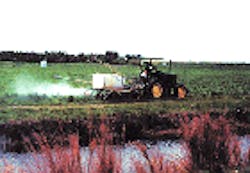EPA Proposes New Permit Requirements for Pesticide Discharges
The U.S. Environmental Protection Agency (EPA) is proposing a new permit requirement that would decrease the amount of pesticides discharged to the nation's waters and protect human health and the environment. This action is in response to an April 9, 2009, court decision that found that pesticide discharges to U.S. waters were pollutants, thus requiring a permit.
The proposed permit, released for public comment and developed in collaboration with states, would require all operators to reduce pesticide discharges by using the lowest effective amount of pesticide, prevent leaks and spills, calibrate equipment and monitor for and report adverse incidents. Additional controls, such as integrated pest management practices, are built into the permit for operators who exceed an annual treatment area threshold.
“EPA believes this draft permit strikes a balance between using pesticides to control pests and protecting human health and water quality,” said Peter S. Silva, assistant administrator for EPA’s Office of Water.
EPA estimates that the pesticide general permit will affect approximately 35,000 pesticide applicators nationally that perform approximately half a million pesticide applications annually.
The agency’s draft permit covers the following pesticide uses:
• Mosquito and other flying insect pest control;
• Aquatic weed and algae control;
• Aquatic nuisance animal control; and
• Forest canopy pest control.
It does not cover terrestrial applications to control pests on agricultural crops or forest floors. EPA is soliciting public comment on whether additional use patterns should be covered by this general permit.
The agency plans to finalize the permit in December 2010. It will take effect April 9, 2011. Once finalized, the pesticide general permit will be used in states, territories, tribal lands and federal facilities where EPA is the authorized permitting authority. In the remaining 44 states, states will issue the pesticide general permits.
Source: U.S. EPA
